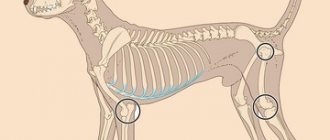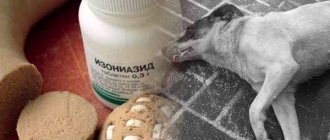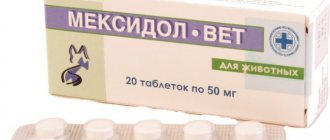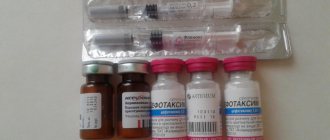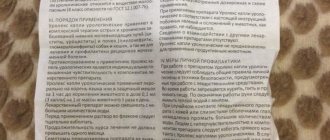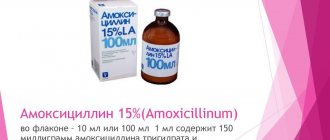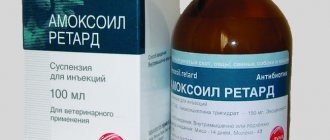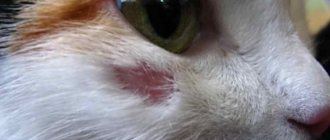Composition and therapeutic effect
The powder, which is sold in pharmacies and is actively used in official medicine, is nothing more than diosmectite, a compound of magnesium and aluminum. The composition also includes auxiliary components and flavorings. The sorbent has an enveloping effect, thanks to which it protects the mucous membranes of the stomach and intestines from toxins, the negative effects of bile and acids.
Smecta is used for diarrhea, bloating and abdominal pain, and poisoning. It reduces the absorption of toxins and irritation of the mucous membrane of the esophagus, stomach, and intestines. Diosmectite helps collect and remove pathogens from the food tract and the animal’s body.
The medication is safe for dogs, therefore it is often used as first aid for loose stools and abdominal pain in a pet, however, if there are dangerous symptoms indicating a viral, infectious nature of the disease, severe intoxication of the body, you should not self-medicate, but immediately contact a veterinarian clinic.
Is it possible to give Smecta to a dog without a prescription?
Smecta for dogs against diarrhea can be used even before contacting a veterinarian. The drug is one of the safest medicines for animal health. Smecta for puppies can also be used as first aid for your pet.
The use of the drug is allowed not only in adult dogs and puppies, but also in pregnant and lactating bitches.
On the first day of symptomatic treatment, the pet is not fed for 8-12 hours.
If the animal’s condition does not improve after taking the adsorbent, it vomits and feels sick, you should immediately consult a doctor to find out the cause of the poor health.
Purpose
Intestinal upset and loose stools can be caused by many reasons. In puppies, this can be normal overeating; in adult dogs, it can be a change in diet, helminthic infestation, infection with pathogens, an allergic reaction, or stress. Veterinarians recommend giving Smecta to pets if they have the following symptoms:
- diarrhea, including of unknown origin;
- abdominal pain, bloating, rumbling;
- nausea, vomiting caused (even presumably) by poisoning;
- inflammation of the esophageal mucosa (esophagitis), which is manifested by refusal to eat, weight loss, and pain in the cervical region of the esophagus upon palpation.
The sorbent will help the animal get rid of pain and rumbling in the stomach, increased gas formation that accompany diarrhea. It is used as part of complex therapy for acute and chronic diarrhea caused by food allergies and long-term use of certain medications. Smecta will also help get rid of heaviness in the stomach after overeating, which is usually typical for small puppies who do not know the feeling of fullness.
Important! Smecta will not help, and you should immediately contact your veterinarian if blood is found in the stool. The reasons can be different - from penetration of a foreign object into the gastrointestinal tract, which caused intraintestinal bleeding, to dangerous diseases - enteritis, plague.
Diarrhea always accompanies poisoning. On the one hand, frequent bowel movements help remove harmful toxins. On the other hand, beneficial microorganisms leave the body along with feces, while pathogenic ones develop faster. Dysbacteriosis leads to weakening of the entire body. In case of poisoning by poor-quality food or chemicals, the sorbent will protect the mucous membrane of the stomach and intestines from the aggressive effects of toxins and will help quickly remove poisons from the body.
Important! Prolonged diarrhea can cause dehydration, so if anti-diarrheal medications do not help, you should contact your veterinarian.
Smecta instructions for use
Release form
Powder for the preparation of suspension for oral administration (vanilla) 3 g: sachets of 10 or 30 pcs.
Powder for the preparation of suspension for oral administration (orange) 3 g: sachets of 10 or 30 pcs.
pharmachologic effect
Antidiarrheal drug, is an aluminosilicate of natural origin. Has an adsorbing effect.
Stabilizes the mucous barrier of the gastrointestinal tract, forms polyvalent bonds with mucus glycoproteins, increases the amount of mucus and improves its cytoprotective properties (with respect to the negative effects of hydrogen ions of hydrochloric acid, bile salts, microorganisms and their toxins).
It has selective sorption properties, which are explained by its discoid-crystalline structure; adsorbs bacteria and viruses located in the lumen of the gastrointestinal tract.
Smecta® in therapeutic doses does not affect intestinal motility.
Diosmectite is radiolucent and does not stain stool.
Aluminum in the composition of diosmectite is not absorbed from the gastrointestinal tract, incl. for gastrointestinal diseases accompanied by symptoms of colitis and colonopathy.
Pharmacokinetics
Smecta® is not absorbed. It is excreted from the body unchanged.
Indications
acute and chronic diarrhea (allergic, drug origin; in violation of diet and quality food composition);
diarrhea of infectious origin (as part of complex therapy);
symptomatic treatment of heartburn, bloating and abdominal discomfort and other symptoms of dyspepsia accompanying diseases of the gastrointestinal tract.
Dosage regimen
Adults are recommended to use 6 sachets per day.
Children under 1 year of age - 2 sachets/day for 3 days, then 1 sachet/day; children over 1 year old - 4 sachets/day for 3 days, then 2 sachets/day.
Adults are prescribed 3 sachets/day.
Children under the age of 1 year - 1 sachet/day, at the age of 1-2 years - 1-2 sachets/day; over 2 years - 2-3 sachets/day.
A course of treatment of 3-7 days is recommended.
For esophagitis, Smecta® should be taken orally after meals, for other indications - between meals.
Dosage
The instructions for use say that the contents of the sachet should be diluted in 50 ml of warm water. The powder does not dissolve completely, so it must be stirred before giving it to your dog.
For puppies and small breed dogs, this dose will be excessive. You can calculate the required amount of the drug as follows: per 1 kg of pet’s weight – 1 ml of a suspension diluted with water. Approximate dosage:
- small animals – 5-15 ml;
- medium breed dogs – 25 ml;
- large specimens – 50 ml.
Important! In case of severe diarrhea, doctors can double the dose - up to 2 ml per 1 kg of body weight.
Smecta can be safely given to an animal up to six times a day (for large dogs - up to six sachets per day). The treatment regimen depends on the severity of the disease, condition, and the presence of other symptoms that make it possible to establish the cause of loose stools. The standard course of taking the sorbent is 3-7 days; an individual treatment regimen is drawn up by a veterinarian.
Features of therapy
Taking the medicine requires compliance with certain rules. You should not give it on a full stomach, since any food is an irritant to the intestines. The exception is esophagitis (inflammation of the esophageal mucosa), when the pet first needs to be fed, then given medicine.
But drinking more clean water is good for your dog! With diarrhea, the body loses a lot of fluid, so it must be restored, since severe dehydration can be fatal.
Before using the sorbent, it is necessary to carry out a tolerance test - first give a small amount of the diluted suspension, then, in the absence of an allergic reaction, give the required dose.
If it is necessary to give animals, in addition to Smecta, other medications prescribed by a veterinarian, an interval between them should be at least 1.5-2 hours. The absorbent may reduce the effectiveness of other medications.
Analogs
Since Smecta has virtually no contraindications and is inexpensive - in a regular pharmacy the cost of 1 sachet is 15-30 rubles, substitutes for the drug are rarely used. Analogues in composition are:
- Neosmectin;
- Endosorb;
- Diosmectin.
These medications are diluted and used in the same way as Smecta. Drugs that are used in official medicine for humans have a similar effect, but also help animals. These are sorbents:
- Activated carbon;
- Polysorb;
- Enterosgel.
They can be used in consultation with a veterinarian, who will determine the dose of medication for treatment.
In addition to medications sold in regular pharmacies, there are also special veterinary adsorbents - Vetsorbin, EnteroZoo. Their advantage is a precisely calculated dosage specifically for animals, the disadvantage is their high cost.
Purpose and effect of the drug
Smecta can be called a harmless and safe remedy. This drug can be given to a puppy without fear, at least it will not make it worse. Smecta is a widely available drug both in terms of prevalence and price. Just one caveat: the drug is designed for humans, so it does not contain instructions for treating animals.
The drug is available in powder form with a pleasant, sweet odor. The color of the powder is beige-brown, the consistency is homogeneous. Packaging is done in sachets for single use. Smecta has no contraindications or side effects, however, manufacturers admit the possibility of individual intolerance to the components.
Note! To use Smecta, it must be diluted in water. Taking the drug in dry form significantly reduces the degree of absorption; it is also easy to choke on the powder.
Diarrhea occurs due to more active work of the intestinal mucous membranes. By producing mucus, the body strives to protect tissues from injury and further irritation. The reaction of the mucous membranes may indicate the presence of toxins, parasites or an object that mechanically injures the intestines. The condition can be greatly complicated by dysbiosis, since diarrhea intensifies if the microflora does not resist harmful bacteria.
Smecta has two main effects:
- Envelops the intestinal walls, protecting them from further irritation.
- Eliminating toxins accumulated in the intestines.
Note! The sorbent binds toxins and quickly removes them from the body with urine.
Please note that during the treatment of the acute stage of diarrhea, it is better not to feed the dog. Food that enters the intestines will irritate the intestines even more, which will lead to a worsening of the condition and the threat of dehydration. It is worth understanding that in the acute stage the intestines swell, that is, swell, so even a small amount of food will cause harm.
Treatment of diarrhea in dogs with Smecta is safe and allows you to prevent another problem - disruption of peristalsis. This mechanism is optimal if the causes of diarrhea are not fully known. Under some circumstances, even gentle therapy can lead to stopping peristalsis. In this case, you will be faced with another, but more serious need - starting the work of the gastrointestinal tract. There are drugs that stimulate intestinal contractions, but such treatment is always carried out “at random”. If the animal is weakened, the gastrointestinal tract may not work at the same level.
Important! Do not use Loperamide without a doctor's prescription! This drug does not treat diarrhea; it stops intestinal motility.
Smecta is prescribed for both treatment and prevention. Typically, the drug is used to eliminate an acute condition or the consequences of a disorder of the gastrointestinal tract. Such disorders include diarrhea, vomiting and nausea. Constipation cannot be treated with Smecta, as is the root cause of the disorder.
The only side effect that may occur when the dose of the drug is overestimated is constipation. If this happens to your pet, do not panic, just stop giving Smecta or reduce its intake to half the dose. In such a situation, stopping diarrhea and fluid loss is more important, especially if the dog is on a starvation diet. If constipation does not go away within 6-8 hours, you can give your dog some Vaseline oil.
Note! Smecta should not be taken immediately after taking other medications. Due to the absorbent effect, Smecta can reduce the effectiveness of drugs and therapy in general.
